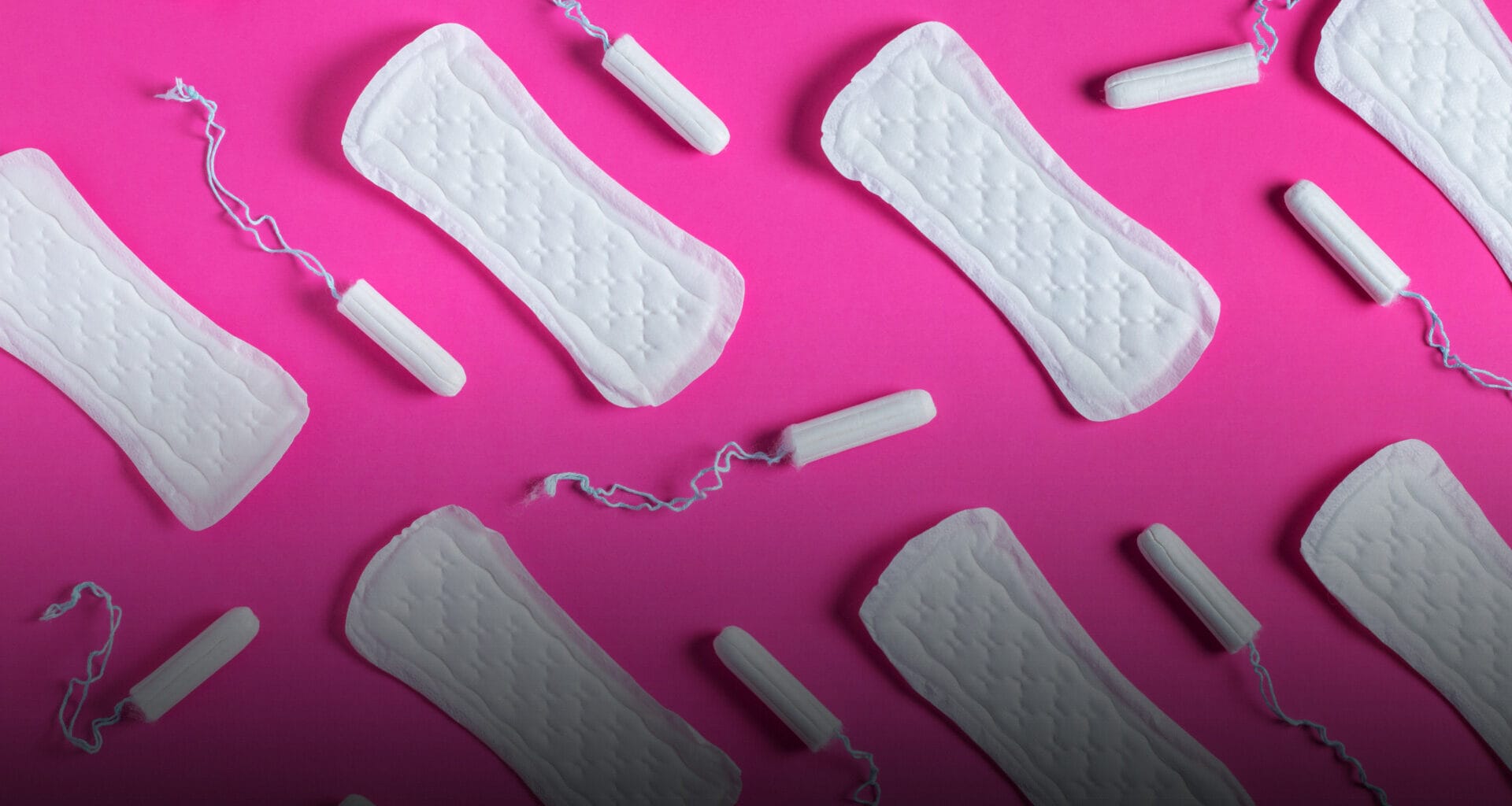Once every four or five weeks, Tampon Taxi driver Jayne Cafferty picks up a bundle of parcels on her way home from work and organises them on the back seat of the car. They’ll be anything from a tiny brown paper bag containing a single box of tampons to a cardboard moving box full of period products to last months.
The name of the scheme conjures up a vivid image but it’s low key, says Cafferty. “It’s not like a Domino’s car with a big tampon on the top or anything like that,” she laughs. Tampon Taxi volunteers like Cafferty use their own vehicles to deliver free period products at doorsteps across Perth. 60 per cent of the parcels are put in the post so they can reach the remote areas of rural Perthshire.
This unique Scottish service started out as an impromptu response from charity PKAVS to a lack of access to sanitary products during the Covid lockdowns. But since last summer – after Scotland became the first country in the world to protect in law the right to access free period products – the supplies are paid for by Perth and Kinross Council.
Under the pioneering Free Period Products Act Scottish local authorities are now required to distribute menstrual supplies without charge. The act is designed to eliminate period poverty and reduce menstrual stigma.
Earlier this year, The Ferret looked at how the new law was working in practice and found less than half the funding allocated to Scottish councils in the run-up to the launch of the flagship policy was spent on the provision of products like tampons and sanitary towels. Some councils spent as little as two per cent of their allowance last year.
We found every council has different arrangements. Dumfries and Galloway and North Lanarkshire councils also contract local organisations to make home deliveries of free sanitary products.
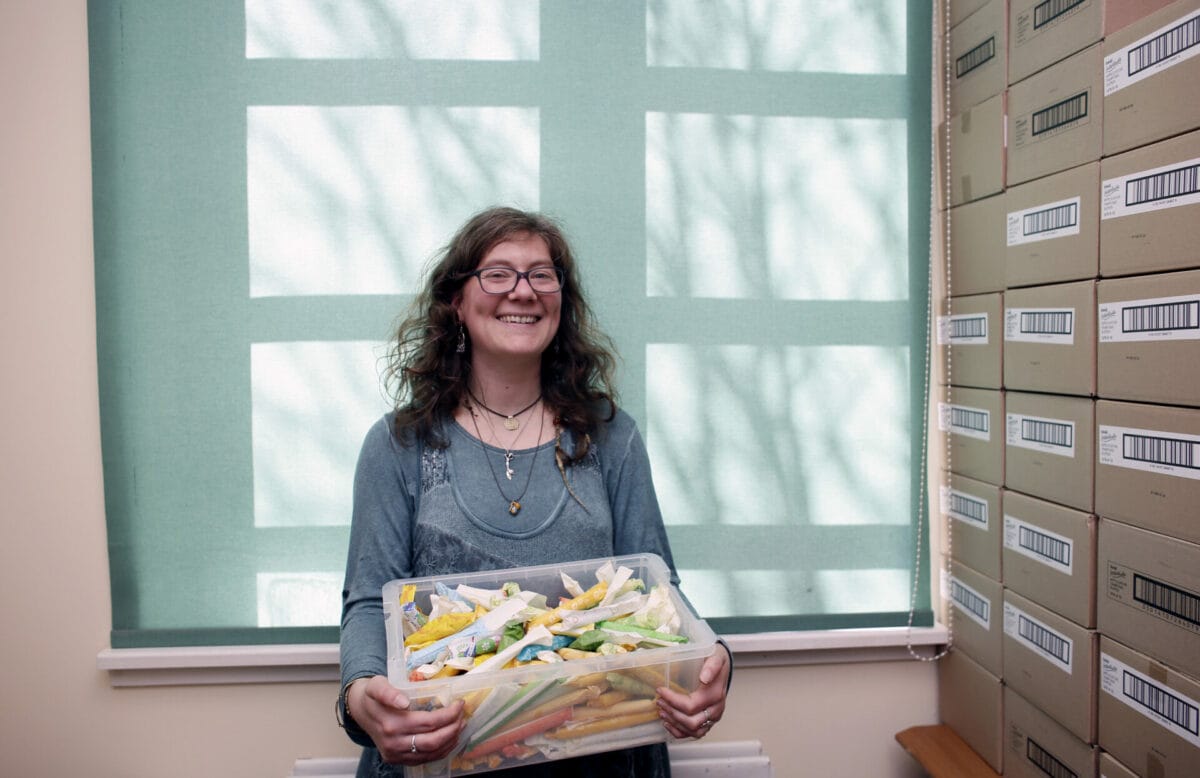
West Dunbartonshire supplies the Community Foodshare charity running a phone service for emergency deliveries.
In Perth – where, in common with other councils free period products are now available in schools, community centres and city chambers – additional funding is spent on the Tampon Taxi.
To mark World Menstruation Hygiene Day, The Ferret visited the small city where the council claims to have spent £50,000 giving away sanitary products since 2018 – ten per cent of its Scottish Government funding under the Free Period Act.
So, is the Tampon Taxi really the best way to ensure the ambitious – and world-first – universal distribution scheme keeps its promise?
‘Just for you’
Alex Effinger, the fairness and dignity officer at charity PKAVS and programme manager for Tampon Taxi, sees the anonymous, fuss-free online order service as an essential way of making sure vulnerable and marginalised people get the products they need.
She is happy with the impact of the programme so far. The service has had orders from over 4,000 people since it started in 2020 and has 255 regular subscribers receiving a parcel each month. Four volunteers cover deliveries in Perth, Kinross and Blairgowrie while parcels to more remote areas are sent by post.
Many people hear about the delivery service online but volunteers and satisfied customers also draw in new users too. Cafferty has noticed new sign-ups on her delivery trips that seem to have come through word-of-mouth recommendations. “I’ll see a new address pop up but they’ll be the neighbour of someone who already uses the service so that means they must have been telling their pals about it,” she explains.
With the cost-of-living crisis biting hard, local support groups are also making increasing use of the service. Amanda McClintock, a trustee of Perth’s Women’s Wellbeing Club, has referred women attending their weekly group to the Tampon Taxi to after trying it herself.
She likes the range of types that Tampon Taxi offers which allows her to test new ones, including the menstrual cup. “For me it’s all about finding things that fit me and my body and what I’m going through rather than doing what I used to do, which was just using whatever was the norm and what I could get in the supermarket,” she says.
“People don’t always have control over their choice and get what they’re given. It’s fantastic to see food banks adding sanitary products to their packs, but your choice is limited. Tampon Taxi is really useful because it gives choice back to people.”
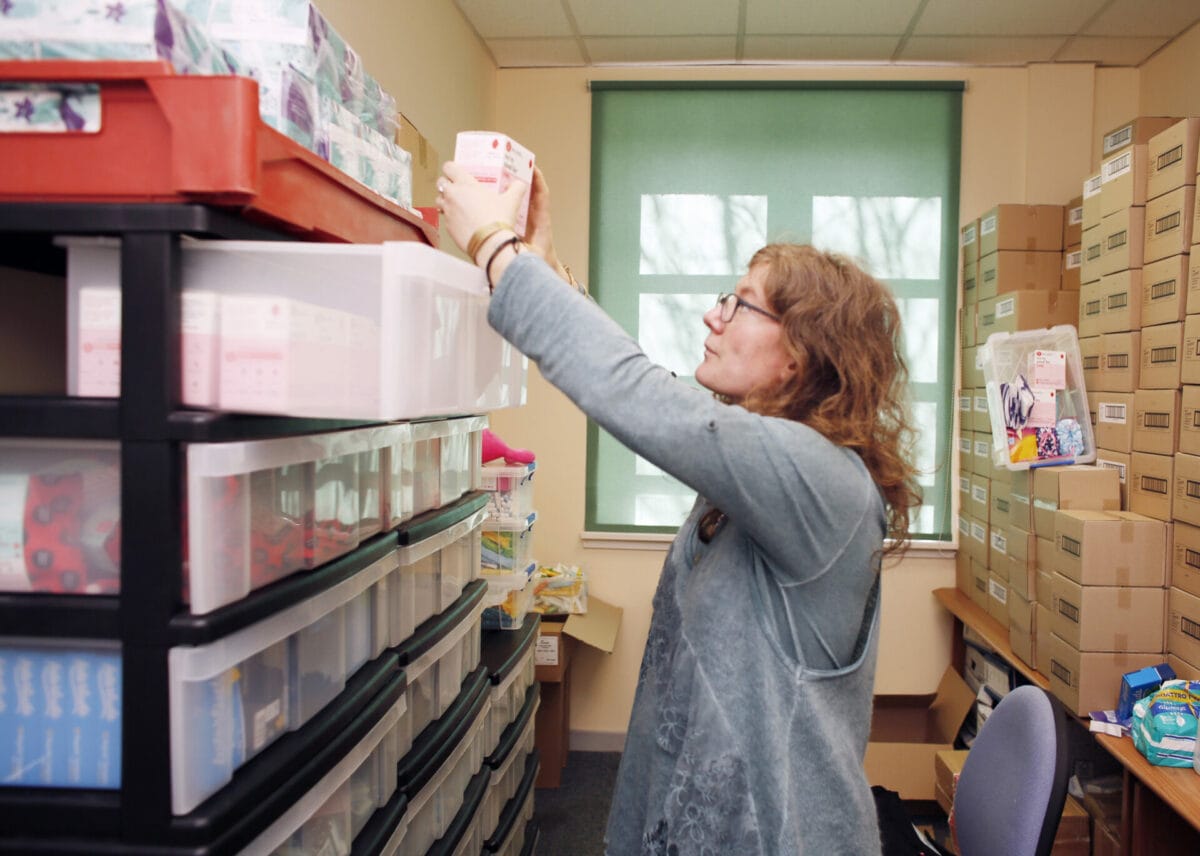
‘Open to everybody’
Advocates of the Tampon Taxi say it’s different from the provision of period products in public spaces, not only delivering the right amounts of the products women actually want and use, but doing so in a way that is more discreet.
Tampon Taxi asks no questions, says Effinger, and the only personal information required for a delivery is a name and postal address.
That can be important for girls as well as women. Schools provide menstrual products in the toilets.
“But not every child is going to be comfortable asking any member of staff,” says Cafferty, who works as a PE teacher. “A kid might have a male teacher all day. Are they going to be comfortable asking a man for a pad? Is the man going to be comfortable being asked for a sanitary product?”
Effinger cites a 2017 survey from Plan International UK of 1,000 British girls and young women aged between 14 and 21, that found only one in five felt comfortable discussing their period with school staff and 48 per cent felt embarrassed by their period. “Which is absolutely shocking,” she says.
She believes the numbers would still hold up today. “There is still a lot of stigma, a lot of myth about periods, that they are unhygienic, unclean.”
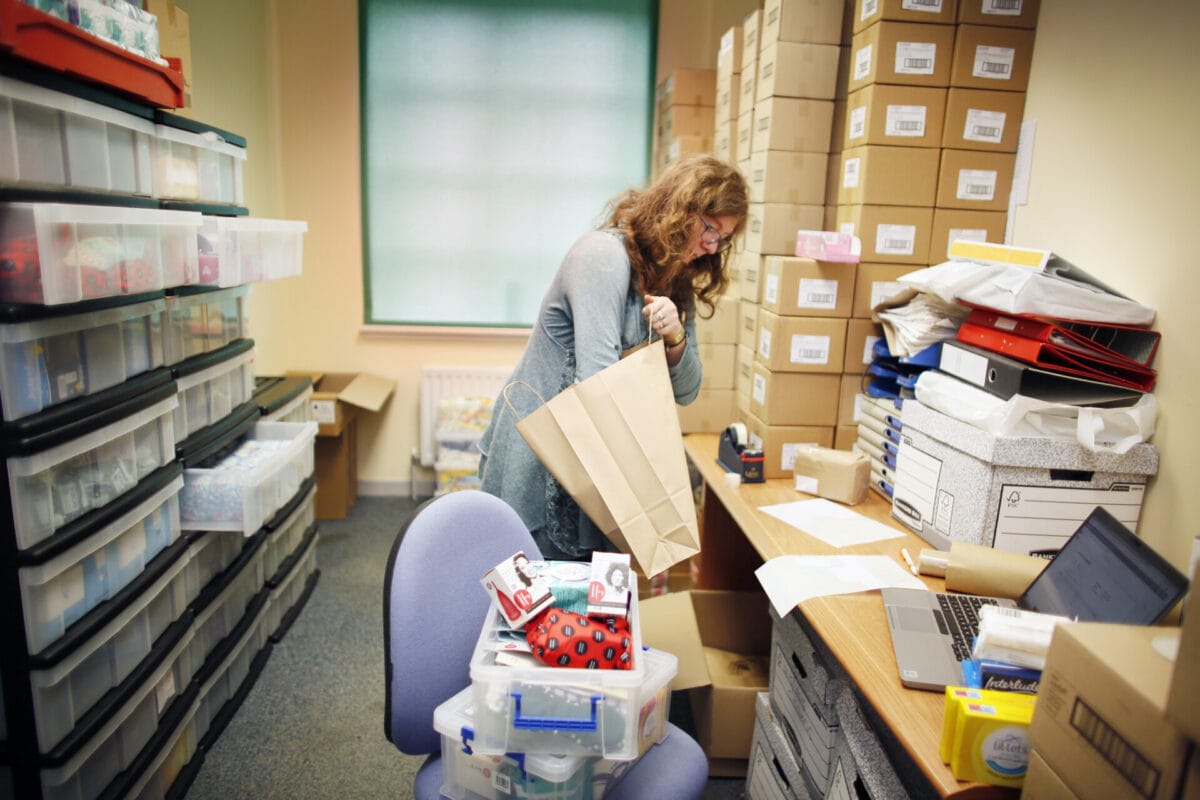
‘The big picture of period poverty’
Professor Marcy Karin, law professor at the University of the District of Columbia, USA and visiting scholar at the University of Edinburgh, spent a year learning from Scotland’s world-first policy.
Karin says: “The Period Products Act deserves its reputation as ground-breaking legislation. It brought menstruation into the public discourse and kick-started a conversation about how laws may be necessary to remove existing structural barriers related to the menstrual cycle from menarche through menopause. This is not a small thing—having Scottish lawmakers, media, and the community talk about periods matters.”
But she notes that while the bill reduces the inequalities of menstruation, it doesn’t eliminate them.
The policy is focussed on absorption products only but they are just one piece of the period product jigsaw, which includes medication, heating pads, clothing. For true menstrual justice, policy needs to consider more, says Karin. That should include workplace modifications such as breaks and access to facilities, protection against harassment and discrimination, funding support for medical and legal interventions, and a comprehensive menstrual education.
Without the buy-in from the people who are implementing and from the local population, you’re never going to have a successful policy.
Dr Jennifer Martin, Pandemic Periods
Pandemic Periods, a global menstrual health campaign made a list of policy recommendations which include the need for local partnerships, menstrual education and knowledge sharing.
Dr Jennifer Martin, its founder, urged local authorities and the Convention of Scottish Local Authorities (COSLA), to take its findings to heart to achieve success in implementation. “Without the buy-in from the people who are implementing and from the local population, you’re never going to have a successful policy.”
Tampon Taxi reached similar conclusions by building on the experience of its own members. Effinger understands that making sure people can get the products they need is only the first step towards stigma-busting period dignity. Targeted training, better public awareness and improved service accessibility come next. “Slowly we are trying to tackle the problem from the ground up,” she says.
Cafferty believes bottom-up involvements like volunteering can be an eye-opener, too. “Until I started volunteering, I was very unaware of the bigger picture of period poverty, that there’s more to it than just educating young people on how your menstrual cycle works.”
Now her school is talking to Effinger about setting up an education training programme and a pick-up point for online orders at the school.
Limits to local solutions
While Tampon Taxi is available to all residents of Perth and Kinross, the same service is not yet available in other parts of Scotland.
“My friends who live in Glasgow and Dundee can’t find this system,” says Cafferty. It just throws me that Glasgow council doesn’t offer this service because there has to be way more poverty in Glasgow than there is in Perth.”
Karin also stresses the need to address the current postcode lottery. “Flexibility is important,” she acknowledges. “But people who live in the islands or rural Scotland should have the same access to products as those that live in Edinburgh. If the law is meant to provide a universal right, access to products should not be different depending on where one lives or works.”
The law has no enforcement process if councils fail to fulfil their obligations, and no opportunity to appeal how choices are made. Without those mechanisms and with limited transparency, people can end up with different levels of access to products, Karin warns.
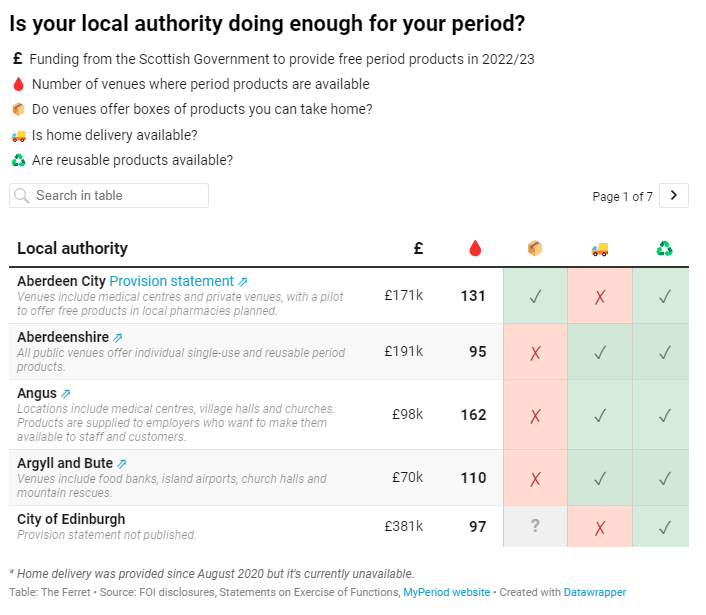
For this reason, Karin believes partnerships with third sector organisations can work but they shouldn’t be the only option. “Charities may have better connections to people or places or understand cultural contexts better than government personnel. transferring responsibility to charities puts statutory obligations even further away from public oversight and accountability.”
There can also be issues with supply. Tampon Taxi re-orders from the council once it’s low but sometimes users have to wait if a product is out of stock.
A spokesperson for Perth and Kinross Council acknowledged ongoing supply issues but said they were occurring nation-wide and were therefore outside council’s control.
“Perth and Kinross Council seeks to freely make available period products to anyone who menstruates, in an accessible, comfortable and dignified way. We have voluntarily provided free period products to a number of community locations since 2018, and the number of venues has continued to grow in that time, now totalling over 100 across the council area.”
The council agreed to financially support PKAVS to continue the Tampon Taxi service after considering its Community Planning approach, which “strives to bring together public bodies and the third sector with local communities” to deliver services.
"All funds to date provided by the Scottish Government have been used to purchase period products for free distribution, and associated materials including storage bags for discreet provision in public facilities."
This Ferret story was also published with Sunday National. Our partnerships with other media help us reach new audiences and become more sustainable as a media co-op. Join us to read all our stories and tell us what we should investigate next.
It is part of a year-long solutions journalism project between Greater Govanhill Magazine and The Ferret.
Mind the health gap will collaborate with local communities to report on the way inequality leads to health disadvantages and shorter lives. But it also aims to look at the impact across Scotland, and to take inspiration from across the world, including the global south.
We consulted with local agencies in Govanhill, health experts across Scotland and surveyed Ferret and Greater Govanhill readers online. They highlighted the importance of covering health topics that impact on women.
This project is funded by the European Journalism Centre, through the Solutions Journalism Accelerator and is a fund supported by the Bill & Melinda Gates Foundation.












